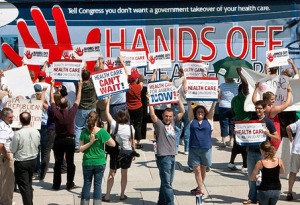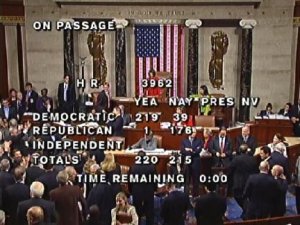Why rhetoric almost drove me away from politics
Have you ever hit a wall doing something you love? This phenomenon is often associated with runners who have to muster up every bit of strength and intensity they can to breach an invisible barrier that threatens to derail their run.
Well I hit a wall (metaphorically speaking) a few weeks ago when the health care debate reached a fever pitch. I’m usually one who appreciates the idiosyncratic aspects of the political game. I cognitively distance myself from the rhetoric and emotion, choosing instead to observe the often comedic routine that is political posturing. But the health care fight took all the fun out of political debating – it became downright ugly.
I’m all for using language strategically and effectively; it’s one of the reasons that I’m in public relations. However, I draw the line at language that drives the public to behave heinously.
I know that my more conservative readers will offer their “proof” as to why I’m wrong to identify the following talking points as inflammatory lies intending to incite nothing less than riots. Let me offer a disclaimer. This blog post is intended to be anecdotal. It was drafted to retell the story of my mounting frustration, so regardless of whether you dispute the validity of my claims, their effects on my psyche were very real. With that taken care of, lets discuss what had me so darn flustered.
Remember back to the Joe Wilson scandal? When he screamed “you lie” during President Obama’s health care address to Congress? Everybody flipped. The GOP demanded he apologize for his inappropriate outburst and the Dems were out for his head. That anger was fueled by an understanding that political rhetoric is all well and good, but everyone has to play by a certain set of rules in order to maintain public order.
Fast-forward six months, and I’ll paint you a gloomier picture where the “disenfranchised” party has determined that it would rather write its own rulebook. Rather than expound upon some of the more egregious incidents that arose from this new dynamic, I’ll leave the wording to New York Times columnist Frank Rich.
There’s nothing entertaining about watching goons hurl venomous slurs at congressmen like the civil rights hero John Lewis and the openly gay Barney Frank. And as the week dragged on, and reports of death threats and vandalism stretched from Arizona to Kansas to upstate New York, the F.B.I. and the local police had to get into the act to protect members of Congress and their families.
How curious that a mob fond of likening President Obama to Hitler knows so little about history that it doesn’t recognize its own small-scale mimicry of Kristallnacht. The weapon of choice for vigilante violence at Congressional offices has been a brick hurled through a window. So far.
Yet it’s this bill that inspired G.O.P. congressmen on the House floor to egg on disruptive protesters even as they were being evicted from the gallery by the Capitol Police last Sunday. It’s this bill that prompted a congressman to shout “baby killer” at Bart Stupak, a staunch anti-abortion Democrat. It’s this bill that drove a demonstrator to spit on Emanuel Cleaver, a black representative from Missouri. And it’s this “middle-of-the-road” bill, as Obama accurately calls it, that has incited an unglued firestorm of homicidal rhetoric, from “Kill the bill!” to Sarah Palin’s cry for her followers to “reload.” At least four of the House members hit with death threats or vandalism are among the 20 political targets Palin marks with rifle crosshairs on a map on her Facebook page.
Click here for the full article
Rich goes on to explain the true source of the public’s discontent, drawing the same conclusion that I came to about a month ago – the conclusion that frustrated me to the point of getting out of politics altogether. This health care debate has very little to do with health care reform.
Obama’s election unearthed some deep seeded unease felt by much of his opposition. His election to the presidency radically changed our political social construct, whether we’d like to admit it or not. It would be too easy to simplify the public’s unrest as being propagated by subliminal racism, sexism, homophobia, etc. But the reality is that our social construct has undergone significant reforms, and not everyone adapts easily to change. The Tea Party movement and the fervency seen in health care opposition is merely a backlash against the evolution of our society.
In identifying the source of this feud, I came to the unnerving realization that no matter what argument I brought to the table, my words would fall on deaf ears. No one wants to debate health care. They want to debate change. They want to qualify every policy change as part of a grander socialist plot to destroy capitalism. They want to polarize our nation as much as possible. They want to feed this monster.
But in viewing this from a historical perspective, I was reassured that the storm will subside. We saw similar passions swell during the inception of the Civil Rights Act of 1964 and Medicare. I once told a friend that this health care debate is simply a war of words that I’m losing. Their party’s rhetoric is more effective than my own party’s, and until we figure out the right way tell the public that health care reform is really a good thing, we can never win this battle.
I was wrong.
The Democrats cannot win the fight for public support on the health care bill. Rather, they need to win the campaign for change. They need to construct a message that assures the American public that changes to our society can be scary, but are ultimately for the best. There are still too many people disenfranchised in this nation. There are still too many people discriminated against. There are still too many people whose health care is inadequately covered. There are still too many people worth helping for me to throw in the towel.





